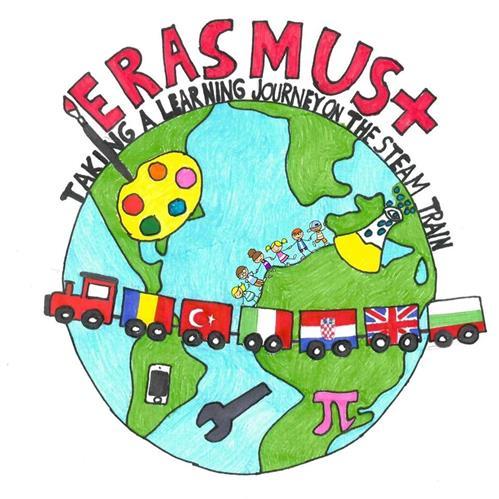
4 minute read
CHAPTER
ANISOARA AYDIN
Erasmus+ Programme- Strategic Partnership Project Number: 2019-1-UK01-KA229-061773
Advertisement


DISCLAIMER: The European Commission support for the production of this publication does not constitute an endorsement of the contents which reflects the views only of the authors, and the National Agency and Commission cannot be held responsible for any use which may be made of the information contained therein.
Edit MOROȘAN Dragomirești Deal, 2022 1
Descrierea CIP a Bibliotecii Naţionale a României
AYDIN, ANIȘOARA
“TAKING A LEARNING JOURNEY ON THE STEAM TRAIN”(2019-2022) -
TEACHER’S GUIDE-/ prof. Anișoara Aydin – Bucureşti : Edit Moroşan, 2022
ISBN: 978-606-626-213-2
Editura Edit Moroșan
Telefon: 0723 889 627
COORDINATORS:
PAULA BLACKBURN ANISOARA AYDIN GALINA ALEKSIEVA NUKEF AKSOY JASMINKA BELSCAK TERESA VALASTRO
ROMANIAN TEAM: Prof. Nicoleta Tone Prof. Tatiana Badea Prof. Laura Ene Prof. Cristiana Gheorghiță Prof. Mariana Stancu Prof. Andreea-Florentina Maruntelu Prof. Mihai Dobre Prof. Roxana Geambașu Prof. Oana Dragnea Prof. Simina-Gabriela Zega
Tipărit la CORMINA PRINT SRL cormina_print@yahoo.com
PROJECT SUMMARY CHAPTER 1 TRAINING MATERIALS
❖ STEM vs. STEAM ❖ Responsible and safe use of digital devices and new media ❖ Basic steps in programming language LOGO: from beginning to Geometrical Art web 2.0 tools: 3D Designing Tools pag. 7
pag. 12
❖ SketchUp ❖ TINKERCARD ❖ LESSON PLANS & LEARNING ACTIVITIES APPS TO CREATE ONLINE MUSIC
❖ Drumbit ❖ Bandlab Creating your virtual tour pag. 21
pag. 23
❖ Vtility ❖ Makevt Communicate, Collaborate, Build Engaging Learning Experiences ❖ Graasp.eu Geometric Art in nature/ human products pag. 29
pag. 31
❖ Loki3.com Making geometric line art –simple drawing using pencil and colour expression and tools pag. 33 ❖ Bomomo ❖ Happydaric ❖ Thisissand ❖ weavesilk 3D PRINTING (training material)-from file to Yoda pag.35 Learning scenarios pag.43 STEAM-Joint Integrated Optional Curricula pag.64 Pupils’Club pag.74
Social inclusion is a priority for Europe so our Project is related to the 2017 European Pillar of Social Rights https://ec.europa.eu/commission/priorities/deeper-and-fairer-economic-and-monetaryunion/ european-pillar-social-rights_en and to 2015 Paris Declaration http://ec.europa.eu/education/news/20150316-paris-education_en It promotes inclusiveness, diversity, equality, gender balance, non-discrimination, tolerance through education, as the strategic framework in Education and Training 2020 http://ec.europa.eu/education/policy/strategicframework_en
Regarding making lifelong learning and mobility a reality. Improving the quality and efficiency of education and training. Promoting equity, active citizenship and enhancing creativity/innovation, entrepreneurship, at all levels. Our children have a variety of social and educational backgrounds. They face obstacles of communicating effectively in the language of the country they live in. Student wellbeing is a priority for us. The need to be more inclusive is a concern and motivation to prevent leaving school early so we decided that the best is an exchange of good practices, as all 6 schools face the same problem: social inclusion.
Back then, in 2019, all 6 partner schools had a need for educational intervention to keep up to date with the latest methods and best practice in European Education and social inclusion through digitalization, gamebased learning, robotics, integrated science, arts and mathematics with digital devices (STEAM).
The Project created a European dimension and promote global citizenship. Over 2 years, we shared the good practice in order to improve the quality, continuous training of teaching staff by organizing 2 short term joint staff training events. The 2 short-term exchanges of groups of pupils ensured a better language competence and ICT competencies. They gained socio-cultural knowledge of the partner countries and become more confident, resilient global learners.
Our project was inclusive to all ages, ability, and gender including children with disadvantaged backgrounds and/or special needs. We aimed to better language fluency, particularly in English
Achieved Objectives:
1.Using non-formal education methods we improved language competences, ICT skills and relationship skills in our pupils from 6 partner schools from Bulgaria, Croatia, Italy, UK, Romania and Turkey during 2 short-term exchange of groups of pupils and Project’s activities.
2.Using structured courses during staff training mobilities, we taught 24 teachers from 6 partner schools from Bulgaria, Croatia, Italy, UK, Romania and Turkey with 15 effective methods of interactive teaching and learning based on web tools 2.0 and robotics; phenomena based learning and inquiry based learning, essential tools for delivering 21st century lifelong teaching and learning strategies and aiming to develop skills of critical thinking, problem solving and research techniques.
3.Using non-formal education methods focused on social inclusion activities we developed the international dimension of 6 partner schools from Bulgaria, Croatia, Italy, UK, Romania, and Turkey by participating in this Project.
4.Using non-formal education methods we ensured an inclusive educational atmosphere in 6 partnership schools participating in this Project an communicating though a variety of media.
Methodology Research, experiments, teamwork, kinaestetic learning approach, phenomenon and inquiry based teaching and learning, discussions, cultural visits, design and making, acting, mobilities.
Results
- Increased motivation by 20% to learn English in 4000 students and 250 teachers from the 6 schools - 4000 students and 250 teachers developed ICT competences by 20% (learning about robotics, programming, web tools 2.0, PPT presentations, creating project materials, Scratch, web design, survey monkey, making videos, training and sharing information and expertise with staff from other schools, scientific investigations and other STEAM related tasks) -Social integration and civic involvement: during 2 short term exchanges of pupils and Project activities, 4000 pupils learnt how to respect, tolerate and integrate with each other Entrepreneurial abilities: during 2 short-term exchanges of pupils, all 6 partner schools organised a local fair and promote their country and its produce. PBL promotes skills required to be young entrepreneurs.
The tangible results Project website, TwinSpace, a Guide for Teachers, Padlets, lionoits, postcards, Project Logo, articles in media, posters, leaflets, schools’ website, Erasmus+ boards, rollups, brochures, testimonials, eTwinning Clubs “Prepared for Future. Prepared for Life” in all partnership schools, folders with best practices/ learning scenarios learnt during this Project,surveys, greet- meet videos.







